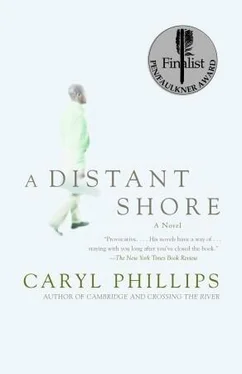This afternoon she went into the new “one-stop” shop by the school. There was a new person behind the counter. A young girl, who had that sunken-cheeked, gypsy-like Romanian look about her. It was difficult to tell, but she was not English. That much was clear. She wondered where the girl’s parents were, and if they intended to come and help out. In her nose the girl wore a polished silver stud like a small ball bearing, and her black hair was flecked with outgrowths of purple. The child was making a statement, but it was one that was badly in need of interpretation. She chose an expensive bottle of wine and then she pointed to a doll on the top shelf. The foreign girl reached skywards and handed it to her in order that she might inspect it. “You like?” She ignored the girl and then turned the doll first one way and then the next. She knew that she was going to take it, but she was simply going through the motions. She opened her purse and handed the girl a twenty-pound note, and the girl opened the till and reckoned the change with surprising ease. Then, ignoring her customer’s outstretched palm, the girl placed the money on the counter and began to put the doll and the bottle of wine into the same paper bag. She gathered up her change and took the paper bag from the immigrant girl without glancing in her direction or offering any thanks. Once she reached home she took the expensive bottle of wine from the bag and put it in the fridge to chill. The doll she left in the bag and she placed it beside her briefcase. She dimmed the lights and lit the candles. She made Rhogan Josh. And then she readied herself. And waited. But there is no knocking at the door. There is no rattling of the letterbox.
In the morning she stops by the shop for her Daily Mail . She closes the door behind her. Feroza is serving a man who seems to be paying a bill. He is squinting at a printout, his glasses pushed up onto his crumpled forehead. She knows that he is questioning Mahmood’s arithmetic. Or worse, his honesty. Feroza looks at the man with contempt, and then she glances up at her new customer. The child is asleep in a basket on the counter, which makes her look like a gift that has been delivered and unwrapped. Feroza tosses the Daily Mail onto the counter top. She taps the counter with her knuckles and asks, “Anything else?” The man is absorbed by his puzzled squinting and so she steps around him and approaches the counter where the Daily Mail sits between these two women like an unsigned contract.
“I’ve brought this.” She plunges a hand into the paper bag and produces the blonde-haired doll. “For your child.”
She offers it as a gift to the wife, who looks first at the doll, and then at her. Feroza’s eyes ignite with indignation. The man looks up from the arithmetic, and then the wife spits at the Englishwoman and catches her in the face with her spittle. Feroza moves to spit again, but what spit she has left gets caught on her lower lip and hangs as a stringy testament to her loss of control. She leaves the doll and her Daily Mail on the counter top. She turns and exits the shop with the fierce eyes of the wife, and the puzzled eyes of the man, boring into her back. The doorbell tinkles as she opens the door, and the glass rattles as she closes it behind her. Only when she is safely outside does she take the sleeve of her coat and wipe the spittle from her face.
She ought to have known better. She sits in the dusk clutching a mug of cocoa with both hands as though she needs to keep them warm. She can barely remember her day at school, but she is sure that she gave the outward appearance that everything was fine. She can feel her feet perspiring lightly, which they always do when she is racked with any kind of anxiety. At her age she ought to have known better than to patronise a thirty-year-old woman and her child. She had been arrogant enough to presume that she could deceive this woman, who said precious little but whose hooded gaze spoke volumes. Perhaps an apology would make things right, and enable her to close this chapter with some dignity. At present this is all that she desires. Closure with dignity. Nothing more. She telephones him when she imagines that Feroza will have gone to sleep. “Mahmood,” she whispers, “it’s me. I’m sorry for calling, but I think I need to see you.” There is silence. “I need to explain about this morning, that’s all.” There is a silence that is clearly informed by his exasperation. And then he speaks.
“You must buy your newspaper somewhere else. I do not wish to know you.” He puts down the phone. He does not wish. He does not wish. She replaces the telephone on the cradle and holds on to the receiver as though readying herself to make a follow-up call. But there will be no follow-up call. She will draw a hot bath, and then there will be another mug of hot cocoa, and then she will go to her bed, which has unfortunately begun to feel light without a double load. In the morning she will remedy this situation. She will purge her house of all signs of Mahmood, and then she will discover another route to school. One which will neither stir her memory nor trouble her conscience.
It is Monday morning. She sits in the staffroom during a double-free period. Time to do some marking and make a cup of coffee, if she can find a clean cup. The staff have long ago given up the idea of their having individual cups, for invariably somebody would use somebody else’s cup and this would lead to a falling out and general bad feeling. This morning she finds a cup that, with a quick rinse, is tolerable. She is also lucky enough to find biscuits that are not stale. And then, as she stirs the UHT milk into the coffee, she looks up and sees him idling by the door.
“Well, come on in. Nobody’s going to bite.” He is dressed in the uniform of a relief teacher. His suit is smart, the shoes are well polished, the tie neatly knotted, and the strangely creased shirt is clearly package-fresh. The biggest give-away is the briefcase, which is emaciated and concave as though eager to be nourished with badly written papers. He looks around himself, checking that it really is him that this woman is speaking to. Now he steps into the staffroom and gingerly closes the door behind him.
“Coffee?” she asks. “I don’t recommend the tea.” He nods, then remembering his manners he speaks.
“Yes, please. Just black. No sugar.”
“Just black, no sugar,” she repeats. He sits down and places his briefcase on the floor. She hands him his cup of coffee, then she picks up her own and sits opposite him. “This is my favourite part of the week. My Monday morning double-free period. I can catch up and get a bit of peace and quiet.” He seems rather alarmed by this confession and puts down his coffee.
“I’m so sorry, I didn’t mean to interrupt.” She looks at him, this timid man with greying temples and rather awkwardly knitted hands.
“Perhaps I should introduce myself. Geoff. Geoff Waverley.” He holds out his hand, which she shakes.
“I’m Dorothy Jones.”
“Pleased to meet you, Dorothy.”
He sounds well mannered enough, but she doesn’t remember giving him permission to call her Dorothy.
“I hope you don’t mind my asking,” she says. “But would you like to go for a drink after school?” He pauses as though unsure how to respond to this overture, and then he laughs nervously.
“Well, why not?”
“It’s all right, I’m quite harmless. And there’s a nice pub that nobody goes into, neither sixth-formers nor teachers. That’s why it’s nice. Your reputation will be safe with me.” He laughs again, the tension flooding out of him in a great volley of high-pitched laughter. She looks at him and smiles. And then, to his evident confusion, she takes a sip of coffee, stands up, and then crosses the staffroom floor and returns to her marking.
Читать дальше











![Карен Кингсбери - A Distant Shore [calibre]](/books/384306/karen-kingsberi-a-distant-shore-calibre-thumb.webp)
